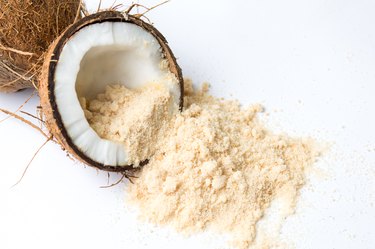
If you've been trying to cut refined sugar in your diet, it's likely that you've seen coconut sugar at the grocery store. This natural sweetener is also known as "coconut palm sugar" or "coco sap sugar" and it's joining the ranks of sugar substitutes.
What Is Coconut Sugar?
Video of the Day
Despite its name, coconut sugar doesn't actually come from coconuts. Instead, it's a sugar made from the sap of the coconut palm tree, per Michigan State University. It's been used as a sweetener for many years in Southeast Asia.
Video of the Day
Coconut sugar looks and tastes a lot like brown sugar, but the crystals are a little bit larger, drier and flakier.
It can work as a 1:1 substitute for cane sugar in some recipes. But the slightly drier consistency could have some effect on your homemade baked goods' texture, so you might need to experiment with adding in a little more liquid.
How Is Coconut Sugar Made?
The process is a bit like making maple syrup or maple sugar. Coconut nectar sap is collected from the trees' flower buds and boiled until most of the liquid evaporates, leaving a thick, sweet syrup.
As the mixture cools, the sugars in the sap crystallize into solid granules that look like brown sugar, according to a report from the Food and Agriculture Organization (FAO).
Coconut Sugar Nutrition Facts
The nutrition and calories in 1 tbsp coconut sugar (about 12.5 grams):
- 45 calories
- 0 g fat
- 12 g carbs
- 12 g sugar
- 0 g fiber
- 0 g protein
Coconut Sugar vs. Table Sugar
Compared to white sugar, coconut sugar contains more vitamins and minerals.
It has trace amounts of vitamin C, as well as minerals like iron, potassium, calcium, zinc and copper. It also has antioxidants and the fiber inulin, according to a November 2017 report in the British Dental Journal. However, you would need to eat a lot of coconut sugar to get any of these benefits.
Sugar is a carb that the body uses for energy. Both coconut and table sugar are made up mostly of sucrose, followed by fructose and glucose, per Michigan State University.
There are 15 calories in one teaspoon of coconut sugar, per the USDA, which is similar to the calorie count in a teaspoon of granulated sugar.
The American Heart Association (AHA) recommends getting less than 100 calories (or 6 teaspoons) to 150 calories (or 9 teaspoons) from added sugar — that's about 25 to 36 grams of sugar, including the coconut variety.
Coconut Sugar’s Low Glycemic Index
The significant difference between coconut sugar and regular table sugar is their glycemic index (GI). The GI measures how food affects the body's blood sugar levels.
Coconut sugar has a GI of 36 while table sugar is around 60, according to Michigan State University. This makes coconut sugar a healthier alternative for people with diabetes.
Foods with high GI levels cause big spikes in blood sugar levels because they are quickly broken down by the body in a "sugar rush," per the University of Washington. This increase in blood sugar levels can have a negative effect on people with diabetes.
Effects of Added Sugars, Including Coconut Sugar
Sugary drinks, along with sweets and cereals are the top sources of added sugar in our diets, per Harvard Health Publishing.
As the name suggests, added sugars are any sugars that have been added to foods during processing. While small amounts of sugar aren't bad for us, eating a diet packed with added sugars is. A diet with too much added sugar can often lead to weight gain and heart disease, according to the AHA.
Coconut sugar isn't good for you, per se, but it's OK to Limiting your added sugar intake — including coconut sugar — plays a key role in maintaining a healthy body.
Related Reading
- American Diabetes Association: Statistics About Diabetes
- American Heart Association: Naturally Occurring Sugars and Added Sugars
- Michigan State University Extension: Gone Coconuts: New Sugar or Old Hype?
- USDA National Nutrient Database: Unrefined Coconut Sugar
- USDA National Nutrient Database: Sugars, Granulated
- Harvard Health Publishing: Are Certain Types of Sugars Healthier Than Others?
- Mayo Clinic: Artificial Sweeteners and Other Sugar Substitutes
- British Dental Journal: Alternative Sugars: Coconut Sugar
- University of Washington: Satisfy Your Sweet Tooth: Natural Sugars
- Advances in Nutrition: Perspective: A Historical and Scientific Perspective of Sugar and Its Relation with Obesity and Diabetes
- 2015-2020 Edition of the Dietary Guidelines for Americans